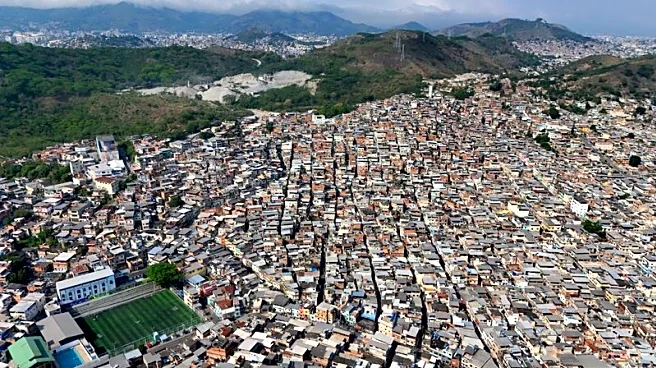By Gram Slattery and Fabio Teixeira
WASHINGTON (Reuters) -The U.S. government approved a sale of sniper rifles to a deadly police unit in Brazil last year, overriding concerns from the U.S. ambassador and
other diplomats that the arms could be used in extrajudicial killings, according to three current and former U.S. officials and documents seen by Reuters.
The Rio de Janeiro police unit that purchased the guns, known as BOPE, played a central role in a raid last week that left 121 people dead, including four police officers. That action drew condemnation from human rights advocates and United Nations experts, who have alleged that some of the killings may have been unlawful.
BOPE purchased 20 sniper rifles produced by Georgia-based Daniel Defense LLC in an unannounced deal in May 2023, according to internal Rio police documents seen by Reuters. The weapons were not received until 2024, amid debate within the State Department about the sale's appropriateness, according to internal Rio police and U.S. State Department documents.
Under U.S. law, gun exports typically need to be approved by the government. While the Commerce Department often issues the final license, the State Department plays a key role in the process.
Elizabeth Bagley, then the U.S. ambassador to Brazil, objected to the deal, as did some diplomats working on human rights and law enforcement issues, according to a January 2024 State Department memo seen by Reuters. That memo describes BOPE as "among the most notorious police units in Brazil in regard to killings of civilians."
Rio police - of which BOPE is the most notorious unit - were responsible for 703 killings last year, according to official data consolidated by the Brazilian Public Safety Forum.
Reuters could not establish whether the U.S.-made sniper rifles were used by BOPE in last week's raid.
BOPE also purchased accompanying suppressors for the rifles, which were produced by Wisconsin-based Griffin Armament, but the suppressor shipment was initially blocked by the U.S. government, according to the documents and sources. Reuters could not determine if the suppressors were ultimately sent at a later date, though the State Department implied that they were not.
"The previous administration's disastrous foreign policies aided and abetted our hemisphere's most violent gangs," a State Department spokesperson told Reuters. "Last year, Biden's State Department denied critical defensive equipment to trusted security partners in Brazil while asking them to protect President Biden during his 2024 trip to Rio. In the interest of a safer hemisphere, we remain committed to ensuring that our partners have what they need to fight vicious criminals."
Former President Joe Biden visited Brazil in late 2024 to attend that year's G20 summit.
TRUMP OFFICIAL CHAMPIONED SALE
The roughly $150,000 purchase was not the first of its kind by BOPE. The unit had successfully imported at least 800 U.S.-made rifles in the past, according to State Department documents. But a series of deadly raids involving the unit in recent years had changed some diplomats' calculus, according to the officials and documents.
Among the transaction's most ardent supporters was Ricardo Pita, then the top Latin America policy staffer on the Republican-controlled House of Representatives Foreign Affairs Committee, according to two U.S. officials, who requested anonymity to describe internal deliberations.
Pita is now a senior adviser for Western Hemisphere Affairs at the State Department. In that capacity, the Venezuelan-born Pita met in May with now-imprisoned former Brazilian President Jair Bolsonaro, a prominent Trump ally who has been an outspoken defender of BOPE's work.
Daniel Defense, Griffin Armament, the Rio police and the Rio state government did not respond to requests for comment, nor did the Commerce Department.
DIPLOMATS OPPOSED DEAL
In mid-2024, Pita, who did not respond to a request for comment, visited a BOPE facility in Rio as part of a congressional staff delegation, the officials said. The visit rankled some diplomats as the State Department has often cited the Rio police in public documents for alleged human rights abuses.
Later that year, Pita pushed diplomats to clear the sale of the suppressors that accompanied the rifles, the officials added. The officials said they were surprised at how persistently Pita pushed for the sale, given that it represented a small part of his portfolio, which in theory stretched from the U.S.-Mexico border to Patagonia.
After joining the State Department, Pita began inquiring internally among State Department personnel about which diplomats had opposed the transaction, two of the officials said.
Some State Department officials supported the sale.
Such transactions are usually approved, in part because foreign police departments typically obtain weapons from another country when they are rejected by the U.S, said several officials familiar with similar sale processes. BOPE is also the principal Brazilian force tasked with protecting the U.S. consulate in Rio should it be attacked, the officials said.
POLICE UNIT POPULAR IN RIO
The unit's work is broadly popular with Rio residents fed up with violent crime, including activity by heavily armed gangs. A nationwide survey by pollster AtlasIntel published on Friday showed 55% of Brazilians backed the police operation, with support rising to 62% among residents of Rio state. Rio police officers lost 55 colleagues to violent deaths last year, according to official data consolidated by the Brazilian Public Safety Forum.
Still, independent experts have frequently criticized BOPE's human rights record, and Rio police generally have been consistently singled out for criticism in the State Department's annual human rights reports on Brazil.
"There was a persistent pattern of impunity for police operations (in Rio), which often resulted in significant fatalities, accusations of excessive force, extrajudicial killings, and denial of medical care for injured criminal suspects," read the 2023 report.
A January 2024 State Department memo recommending against the weapons sale noted that the unit was implicated in the killing of 23 individuals during a single incident in 2022. That event - known as the "Vila Cruzeiro massacre" - tipped the scales for some diplomats away from approving the sale, although BOPE had received U.S. arms in the past, one official said.
There were also concerns that weapons meant to fight crime could in fact be used for criminal purposes, the official added. State prosecutors brought a case last year against some BOPE officers for their ties to organized criminal groups called "militias," which run extortion rackets throughout the city.
(Reporting by Gram Slattery in Washington and Fabio Texeira in Rio de JaneiroEditing by Brad Haynes and Michael Learmonth.)











